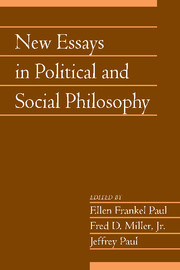Book contents
- Frontmatter
- Contents
- Introduction
- Acknowledgments
- Contributors
- Political Liberty: Who Needs It?
- State Coercion and Force
- Political Legitimacy and Economic Liberty
- Who Owns What? Some Reflections on the Foundation of Political Philosophy
- Human Reproductive Interests: Puzzles at the Periphery of the Property Paradigm
- Why Free Trade is Required by Justice
- Structural Exploitation
- Rescuing Justice from Equality
- Reinterpreting Rawls's The Law of Peoples
- Responsible Choices, Desert-Based Legal Institutions, and the Challenges of Contemporary Neuroscience
- Genocide and Crimes Against Humanity: Dispelling Some of the Conceptual Fog
- Harm and the Volenti Principle
- Education and the Modern State
- Index
Who Owns What? Some Reflections on the Foundation of Political Philosophy
- Frontmatter
- Contents
- Introduction
- Acknowledgments
- Contributors
- Political Liberty: Who Needs It?
- State Coercion and Force
- Political Legitimacy and Economic Liberty
- Who Owns What? Some Reflections on the Foundation of Political Philosophy
- Human Reproductive Interests: Puzzles at the Periphery of the Property Paradigm
- Why Free Trade is Required by Justice
- Structural Exploitation
- Rescuing Justice from Equality
- Reinterpreting Rawls's The Law of Peoples
- Responsible Choices, Desert-Based Legal Institutions, and the Challenges of Contemporary Neuroscience
- Genocide and Crimes Against Humanity: Dispelling Some of the Conceptual Fog
- Harm and the Volenti Principle
- Education and the Modern State
- Index
Summary
Introduction
Works in political philosophy typically build—either explicitly or implicitly—on a foundational concept of rights or of justice; neither of these, however, is satisfactory as a starting point. The concept of rights is unsatisfactory because it is either defined in terms of something else, which is in that case the real foundation, or else it is employed arbitrarily as a matter of intuition. But of course intuitions differ. Presumably, the most plausible candidate for a foundational concept of rights would be natural rights. Natural rights are so called because they are supposedly rooted in human nature. Yet the inherent normativity in the concept of rights is not easily or clearly derived from a nontendentious account of human nature. As for intuitions about rights, few political philosophers seem to limit their accounts of rights to what have been called negative rights. A foundational concept of negative rights faces the intuition problem: which rights, whose rights? But with the introduction of positive rights, the possibility of a conflict of rights inevitably arises and a truly foundational rights theory has, in principle, no resources for resolving these. Founding a political philosophy on a concept of justice has seemed more promising to some. Yet, if “justice” is not merely a formal term like “good,” then neither is “injustice.” And one is then obliged to provide an argument for the claim that a certain specific state of affairs is unjust.
- Type
- Chapter
- Information
- New Essays in Political and Social Philosophy , pp. 81 - 105Publisher: Cambridge University PressPrint publication year: 2013



